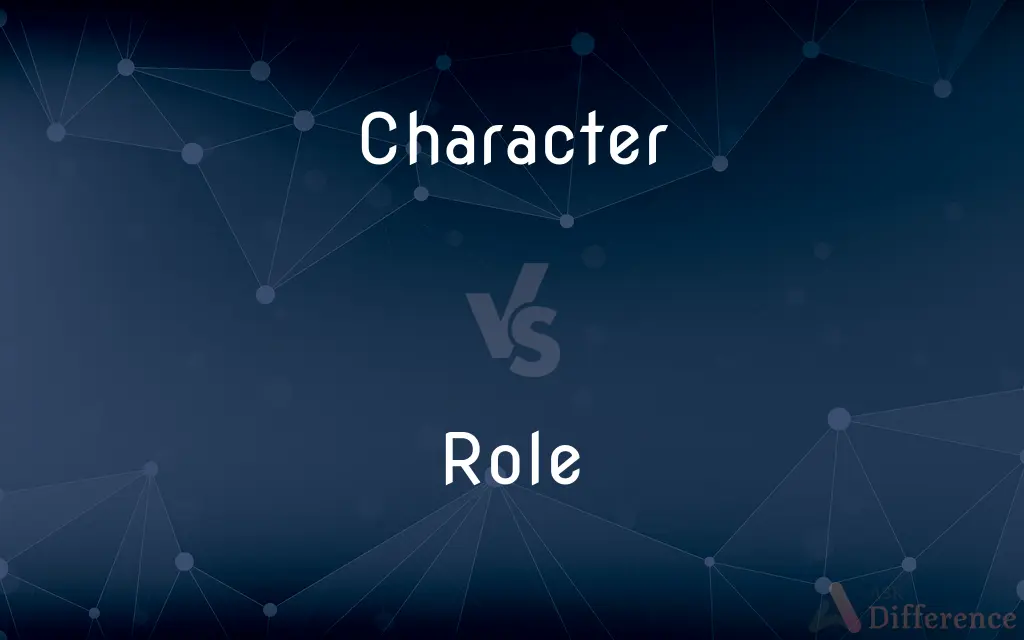Character vs. Role — What's the Difference?
By Urooj Arif & Maham Liaqat — Updated on March 11, 2024
A character is a person or being in a story, while a role is the function or part played by someone or something in a particular context.

Difference Between Character and Role
Table of Contents
ADVERTISEMENT
Key Differences
A character in literature, film, or theater refers to an individual in a story or narrative, whether human, animal, or even mythical. Characters can be complex, with detailed backgrounds, personalities, and development arcs that contribute to the story's depth and engage the audience's emotions and thoughts. On the other hand, a role is more about the function, position, or part that a person or element plays in a specific context or system. In performing arts, a role is the part acted by a performer, embodying a character in a narrative, but the concept of role extends beyond this to include functions in social, professional, or familial contexts.
While a character is bound to the narrative world, offering insights into human experiences, emotions, and growth, a role transcends the boundaries of storytelling. It encompasses the duties, behaviors, and expectations assigned to individuals in various situations, such as a teacher in a classroom, a leader in a community, or a parent in a family. In theater or film, an actor takes on a role by portraying a character, merging the personal interpretation and the scripted character traits to bring the character to life for the audience.
Characters are central to the development of a story, providing the medium through which themes, conflicts, and resolutions are explored. They are crafted with specific traits, backgrounds, and motivations that make them relatable or intriguing to the audience. Roles, while they can be performed by characters, are about the positions individuals occupy within a narrative or society and the expectations tied to these positions.
The distinction between character and role highlights the difference between the identity of individuals in a narrative and the functions or positions they assume. In performing arts, this difference becomes a dynamic interplay where actors or performers imbibe characters with life, emotions, and personality, all the while fulfilling the role these characters play within the story's structure or the wider societal context in which the narrative is received.
While a character is a creation designed to navigate through a narrative, a role represents the duties, behaviors, and expectations associated with a position or function, whether within a story or in real life.
ADVERTISEMENT
Comparison Chart
Definition
An individual in a story or narrative.
The function or part played by someone or something.
Context
Bound to the narrative world of literature, film, or theater.
Can be within a narrative or in real-world social, professional, or familial settings.
Emphasis
On personality, background, and development.
On duties, behaviors, and expectations.
Examples
The protagonist in a novel, an antagonist in a film.
A teacher in a classroom, an actor portraying a character.
Purpose
To engage the audience and drive the narrative.
To fulfill specific functions and meet expectations in a given context.
Compare with Definitions
Character
Undergoes development.
Ebenezer Scrooge in A Christmas Carol transforms from miserly to generous.
Role
Positions in a system.
In an ecosystem, bees play the role of pollinators, essential for plant reproduction.
Character
A fictional person in a story.
Harry Potter is a character known for his bravery and loyalty.
Role
The function or part played.
The role of a teacher involves educating and guiding students.
Character
Relatable to the audience.
Katniss Everdeen in The Hunger Games resonates with themes of sacrifice and courage.
Role
Extends beyond narratives.
In a family, parents play the role of caregivers and mentors.
Character
The combination of mental characteristics and behavior that distinguishes a person or group.
Role
Can be performed by actors.
Meryl Streep’s role as Miranda Priestly in The Devil Wears Prada was critically acclaimed.
Character
Can have complex personalities.
Elizabeth Bennet in Pride and Prejudice showcases intelligence and wit.
Role
Defined by expectations.
A team leader's role includes motivating and managing team members.
Character
Central to the story's themes.
Jay Gatsby in The Great Gatsby embodies the pursuit of the American Dream.
Role
A role (also rôle or social role) is a set of connected behaviors, rights, obligations, beliefs, and norms as conceptualized by people in a social situation. It is an expected or free or continuously changing behavior and may have a given individual social status or social position.
Character
The distinguishing nature of something.
Role
Also rôle A character or part played by a performer.
Character
Moral strength; integrity
An educational program designed to develop character.
Role
The characteristic and expected social behavior of an individual.
Character
Public estimation of someone; reputation
Personal attacks that damaged her character.
Role
A function or position.
Character
(Biology) A structure, function, or attribute of an organism, influenced by genetic, environmental, and developmental factors.
Role
(Linguistics) The function of a word or construction, as in a sentence.
Character
A person considered as having a specific quality or attribute
"Being a man of the world and a public character, [he] took everything as a matter of course" (George Eliot).
Role
A character or part played by a performer or actor.
My neighbor was the lead role in last year's village play.
Her dream was to get a role in a Hollywood movie, no matter how small.
Character
A person considered funny or eccentric
Catcalls from some character in the back row.
Role
The expected behaviour of an individual in a society.
The role of women has changed significantly in the last century.
Character
A person portrayed in an artistic piece, such as a drama or novel.
Role
The function or position of something.
Local volunteers played an important role in cleaning the beach after the oil spill.
What role does the wax in your earhole fulfill?
Character
A person or animal portrayed with a personality in comics or animation
A cartoon character.
Role
Designation that denotes an associated set of responsibilities, knowledge, skills, and attitudes
The project manager role is responsible for ensuring that everyone on the team knows and executes his or her assigned tasks.
Character
Characterization in fiction or drama
A script that is weak in plot but strong in character.
Role
(grammar) The function of a word in a phrase.
Character
Status or role; capacity
In his character as the father.
Role
(object-oriented) In the Raku programming language, a code element akin to an interface, used for composition of classes without adding to their inheritance chain.
Character
A description of a person's attributes, traits, or abilities.
Role
A part, or character, performed by an actor in a drama; hence, a part of function taken or assumed by any one; as, he has now taken the rôle of philanthropist.
Character
A formal written statement as to competency and dependability, given by an employer to a former employee; a recommendation.
Role
The actions and activities assigned to or required or expected of a person or group;
The function of a teacher
The government must do its part
Play its role
Character
A mark or symbol used in a writing system.
Role
An actor's portrayal of someone in a play;
She played the part of Desdemona
Character
A Chinese character.
Role
What something is used for;
The function of an auger is to bore holes
Ballet is beautiful but what use is it?
Character
One of a set of symbols, such as letters or numbers, that are arranged to express information.
Role
Normal or customary activity of a person in a particular social setting;
What is your role on the team?
Character
The numerical code representing such a character.
Character
(Mathematics) The trace function of a representation.
Character
A style of printing or writing
"Here is the hand and seal of the Duke.
You know the character" (Shakespeare).
Character
A cipher or code for secret writing.
Character
Of or relating to one's character.
Character
Specializing in the interpretation of often minor roles that emphasize fixed personality traits or specific physical characteristics
A character actor.
Character
Of or relating to the interpretation of such roles by an actor
The character part of the hero's devoted mother.
Character
Dedicated to the portrayal of a person with regard to distinguishing psychological or physical features
A character sketch.
Character
To write, print, engrave, or inscribe.
Character
To portray or describe; characterize.
Character
(countable) A being involved in the action of a story.
Character
(countable) A distinguishing feature; characteristic; trait; phene.
A single locus governing the petal colour character was detected on the linkage group A2.
Character
A complex of traits marking a person, group, breed, or type.
A study of the suspect's character and his cast iron alibi ruled him out.
Character
(uncountable) Strength of mind; resolution; independence; individuality; moral strength.
He has a great deal of character.
"You may not like to eat liver," said Calvin's father, "but it builds character."
Character
(countable) A unique or extraordinary individual; a person characterized by peculiar or notable traits, especially charisma.
Julius Caesar is a great historical character.
That bloke is such a character.
Character
(countable) A written or printed symbol, or letter.
Character
Style of writing or printing; handwriting; the particular form of letters used by a person or people.
An inscription in the Runic character
Character
A secret cipher; a way of writing in code.
Character
One of the basic elements making up a text file or string: a code representing a printing character or a control character.
Character
A person or individual, especially one who is unknown.
We saw a shady character slinking out of the office with some papers.
That old guy is a real character.
Character
A complex number representing an element of a finite Abelian group.
Character
(countable) Quality, position, rank, or capacity; quality or conduct with respect to a certain office or duty.
In the miserable character of a slave
In his character as a magistrate
Character
The estimate, individual or general, put upon a person or thing; reputation.
A man's character for truth and veracity
Her actions give her a bad character.
Character
A reference given to a servant, attesting to their behaviour, competence, etc.
Character
Personal appearance.
Character
(obsolete) To write (using characters); to describe.
Character
A distinctive mark; a letter, figure, or symbol.
It were much to be wished that there were throughout the world but one sort of character for each letter to express it to the eye.
Character
Style of writing or printing; handwriting; the peculiar form of letters used by a particular person or people; as, an inscription in the Runic character.
You know the character to be your brother's?
Character
The peculiar quality, or the sum of qualities, by which a person or a thing is distinguished from others; the stamp impressed by nature, education, or habit; that which a person or thing really is; nature; disposition.
The character or that dominion.
Know well each Ancient's proper character;His fable, subject, scope in every page;Religion, Country, genius of his Age.
A man of . . . thoroughly subservient character.
Character
Strength of mind; resolution; independence; individuality; as, he has a great deal of character.
Character
Moral quality; the principles and motives that control the life; as, a man of character; his character saves him from suspicion.
Character
Quality, position, rank, or capacity; quality or conduct with respect to a certain office or duty; as, in the miserable character of a slave; in his character as a magistrate; her character as a daughter.
Character
The estimate, individual or general, put upon a person or thing; reputation; as, a man's character for truth and veracity; to give one a bad character.
This subterraneous passage is much mended since Seneca gave so bad a character of it.
Character
A written statement as to behavior, competency, etc., given to a servant.
Character
A unique or extraordinary individuality; a person characterized by peculiar or notable traits; a person who illustrates certain phases of character; as, Randolph was a character; Cæsar is a great historical character.
Character
One of the persons of a drama or novel.
Character
To engrave; to inscribe.
These trees shall be my books.And in their barks my thoughts I 'll character.
Character
To distinguish by particular marks or traits; to describe; to characterize.
Character
An imaginary person represented in a work of fiction (play or film or story);
She is the main character in the novel
Character
A characteristic property that defines the apparent individual nature of something;
Each town has a quality all its own
The radical character of our demands
Character
The inherent complex of attributes that determine a persons moral and ethical actions and reactions;
Education has for its object the formation of character
Character
An actor's portrayal of someone in a play;
She played the part of Desdemona
Character
A person of a specified kind (usually with many eccentricities);
A real character
A strange character
A friendly eccentric
The capable type
A mental case
Character
Good repute;
He is a man of character
Character
A formal recommendation by a former employer to a potential future employer describing the person's qualifications and dependability;
Requests for character references are all to often answered evasively
Character
A written symbol that is used to represent speech;
The Greek alphabet has 24 characters
Character
Engrave or inscribe characters on
Common Curiosities
How does an actor relate to a character and a role?
An actor embodies a character by taking on their role in a narrative, interpreting the character's traits and development through performance.
Can a character have multiple roles?
Yes, a character can assume multiple roles within a story or across different contexts, showcasing various aspects of their personality and contributions.
Why are characters important in stories?
Characters are vital for driving the narrative forward, engaging the audience, and exploring themes through their experiences and growth.
Are roles only relevant in performing arts?
No, roles are relevant in various contexts, including social, professional, and familial settings, defining expectations and behaviors.
Can a role exist without a character?
Yes, roles can exist as conceptual positions or functions within systems or narratives, independent of specific characters.
What makes a character different from a role?
A character is a person or entity in a story, defined by their traits and development, while a role refers to the function or part played by someone in a particular context.
How do characters influence the perception of roles?
Characters can influence the perception of roles by the way they embody and interpret these roles within narratives, potentially challenging or reinforcing societal norms.
What is the significance of role-playing in real life?
Role-playing allows individuals to explore different perspectives, develop empathy, and understand the responsibilities associated with various roles.
How do storytellers create complex characters?
By developing their backgrounds, personalities, motivations, and evolution throughout the narrative to engage and resonate with the audience.
What impact do cultural contexts have on roles?
Cultural contexts shape the expectations and interpretations of roles, influencing how they are perceived and performed in different societies.
Share Your Discovery

Previous Comparison
Slim vs. Trim
Next Comparison
Favorite vs. UnfavoriteAuthor Spotlight
Written by
Urooj ArifUrooj is a skilled content writer at Ask Difference, known for her exceptional ability to simplify complex topics into engaging and informative content. With a passion for research and a flair for clear, concise writing, she consistently delivers articles that resonate with our diverse audience.
Co-written by
Maham Liaqat













































